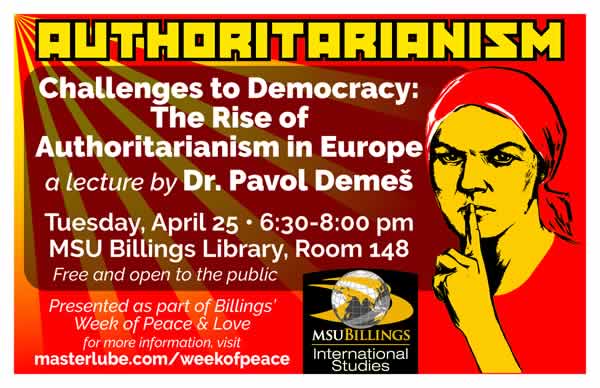University Communications and Marketing
April 21, 2017
Office of International Studies announces lecture on ‘Challenges to Democracy: The
Rise of Authoritarianism in Europe’
Event on April 25 free and open to the public.
Contacts:
International Studies, 657-1705
University Relations, 657-2266
MSU BILLINGS NEWS SERVICES — A lecture focusing on the current rise of authoritarianism in Europe will be held from 6:30 p.m. to 8p.m., April 25, in the Montana State University Billings Library Room 148.
The presentation by Dr. Pavol Demes will also highlight challenges faced by post-socialist Central European states and established democracies in Western Europe. The discussion will include the challenges faced by democracy and civil society in Europe and how a new rivalry between open societies and authoritarianism is affecting international development.
Demes is a well-known Slovak expert on international relations and civil society,
as well as an author and photographer.

Prior to the Velvet Revolution (the non-violent transition of power in what was then Czechoslovakia during late 1989), Demes was a bio-medical researcher at Comenius University in Bratislava.
After democratic changes in 1989, he served in the Slovak government, becoming the
foreign policy advisor to the first president of the Slovak Republic Michal Kovak.
Currently, he a non-resident senior fellow with the German Marshall Fund and board
member of the European Endowment for Democracy.
MSUB Center of International Studies Director Dr. Paul Foster said the lecture is
important as it focuses on troubling global trends that are now being echoed in the
United States.
“There has been a noticeable and sustained increase of authoritarian regimes across
the globe, but in opposed to earlier periods, these are more “soft” authoritarian
governments, marked by the rise of a strong personality, usually elected under dubious
circumstances, but with the veneer of democracy, as the sole leader and guarantor
of a country’s interest,” Foster said. “At the same time, these systems seek to control
information, such as placing restrictions on both the traditional media (newspapers,
television, radio) and new media (internet, social networks).”
Foster said that combined with the current and past attacks on public education, society
now finds itself on the crossroads, with one step in the past idealizing a simpler
time in history when all learning and knowledge was found in a single book, and the
other foot pointed toward a future full of uncertainty, challenges and international
forces.
“This is not Orwell’s Big Brother, but rather a more pervasive attack on civil society at its very core – education and learning,” Foster said.
The lecture is presented as part of Billings’ Week of Peace & Love and is free and open to the public.

